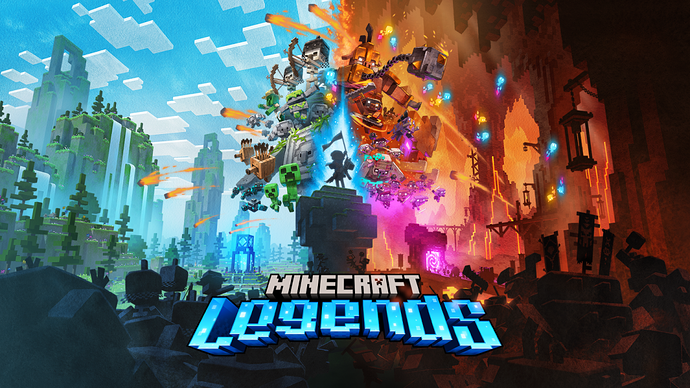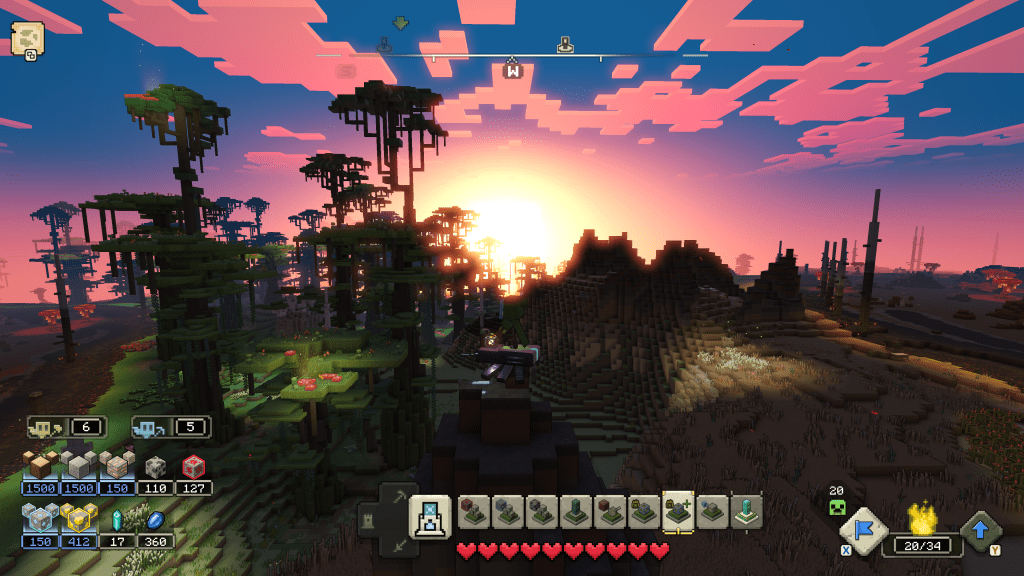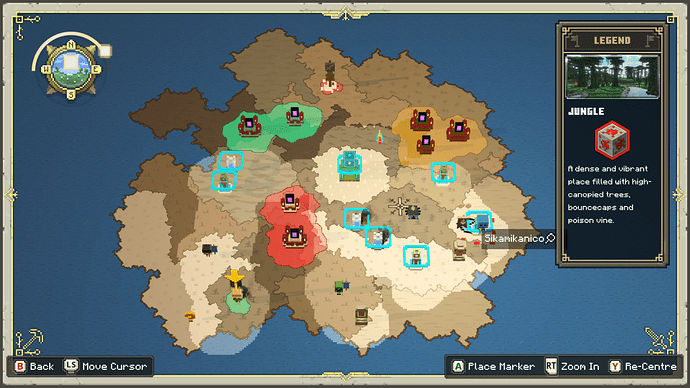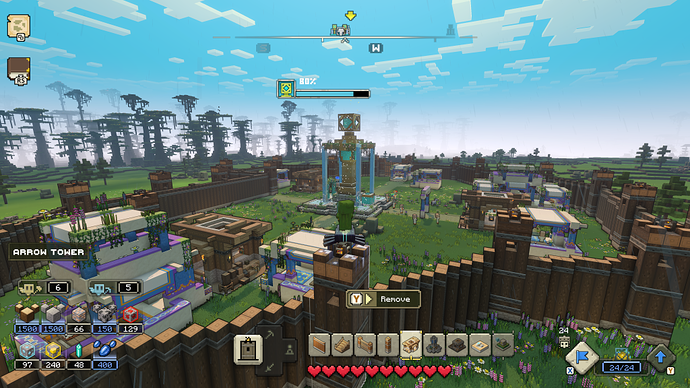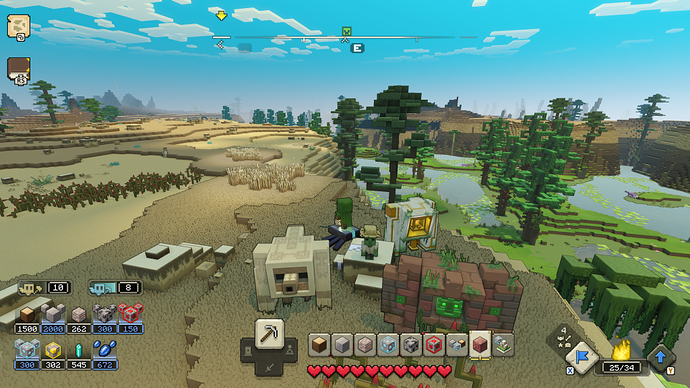Originally published at: Review | Minecraft Legends - XboxEra
Minecraft, that gargantuan franchise that just never seems to stop selling, has once again dipped its toes into another new genre following the successful diablo-lite adventuring of Minecraft Dungeons.
Developed in partnership with franchise custodians Mojang and Blackbird Interactive, does Minecraft Legends surprise and delight?
Let’s find out!
Strategy?! What’s that?
Full disclosure; I’m not the biggest strategy fan on the team here at XboxEra, but I do share a household with a Minecraft expert, that being my 8 year old son. So if, like me, you’re not the biggest strategy fan out there, but want to know if you or more importantly, your kids will enjoy this particular outing in the franchise, this is the review for you.
Minecraft Legends is a blocky take on an action-orientated realtime strategy game. I say action-orientated, because the key difference is instead of the player taking a birds eye view of the battlefield, you’re down in the trenches with your troops, swinging your diamond sword with wanton abandon. There’s a campaign to tackle (in co-op if you wish), and a hefty multiplayer component (which I sense is where the main draw to the game lies) all with cross play included.
Let me set the stage; The Piglins, who live in the Nether Underworld, have created portals and are invading the peaceful, villager filled Overworld with a desire to seize control. Three guardians, known as Foresight, Action and Knowledge, pluck you from your mining activities and task you with thwarting the Piglin threat and restoring peace to the Overworld. It’s all fully voice acted with some pretty cutscenes throughout, with similar slapstick found in the many Travellers Tale’s LEGO games. You’re given a quick tutorial on the mechanics that you’ll be using throughout the game, so you won’t be going in blind.
Firstly, resource gathering and building. The usual wood, stone, diamond, iron, redstone and coal ores are all present and accounted for, but this time it wont be you diligently hammering at the blocks with your fists. Instead, our guides bestow us with Allays, useful friends that will either gather or build for us. It’s as simple as throwing a Allay down for stone or wood, and they’ll gather what’s in range of that particular type of resource. The Overworld itself is split into various biomes, each with a unique resource to be found within it – Dry Savanna is where you’ll find plenty of iron, and Jagged Peaks are where diamonds can be found for example.
We’re also shown how to spawn and command mobs, which is again a relatively simple affair at first, but it soon becomes a lot more complex as the game progresses. You’ll have access to a few basic mobs at first, both ranged and melee based, but as the campaign continues, the overworld will rise up, and you’ll unlock some Minecraft classics, like Creepers, Skeletons and Zombies, all fighting for you instead of against you.
Over and Under
Once you’re thrust into the Overworld itself, the objective unfortunately becomes fairly repetitive; defend villages, gather resources, upgrade your capabilities, attack Piglin outposts. This gameplay loop doesn’t really change, and it leave me feeling like the entire campaign is just a very lengthy tutorial with a story attached to it. There are a variety of difficulties available, and for younger players, I’d recommend sticking with Storied (my son struggled on Fabled, which is Legends version of “normal”). Indeed, as the procedurally generated map grows in size with resources becoming more scarce on higher difficulties, there may be plenty of meat to chew on for dedicated fans.
That’s not to say they don’t introduce some good attempts at variety as the campaign goes on – early in the game, the Piglins split into various “Hordes” with unique characteristics, with Horde of the Spore wielding poisonous mobs powered by some super funky mushrooms as an example. At various points you’ll annoy these factions enough that they’ll send their leaders out to the overworld, and it’s here where you’ll have some of your biggest fights. There’s nothing quite as satisfying as carving a route into an enemy stronghold, and then rushing in with 20 creepers to absolute decimate them, while your skeleton archers rain arrows from on high.
Some of the challenges are less about having the right mobs to take in with you, and more about getting to where you need to go. There’s a fairly simple and intuitive “ramp” building ability to enable to get around, but the pathing for your mobs following you across them needs a little work. On more than a few occasions, my motley crew would fall off the sides, and just stand around until I either went to get them or respawned them back at a Village.
The Villages act as teleportation hubs once they’re repaired and defended, and you can build arrow towers, walls, redstone launchers and more to bolster defences and repel attacks. Your main base of operations, the “Well of Fates” is where you can upgrade your potential, unlocking more Allays to speed up gathering, upgrades to resource caps or entirely new buildings and abilities.
At a certain point, you can unlock an ability to “heal” Nether blocks, allowing you to start building on the salvaged land – this can open up entirely new combat opportunities, as you can build smaller outposts deep within enemy territory, and really deal some damage.
Just in case you lose track of what to do, the game will tell you when the Piglins plan to attack and where, so it’s got a fairly nice pace to things, giving you plenty of opportunity to explore the Overworld.
And explore you should, as the game has plenty of hidden things to find, from new mounts (the beetle was my favourite, allowing me to climb up and surfaces and float down from great heights without taking fall damage) to ancient and powerful golems to join you in battle.
Overall, the developers have done a fantastic job in blending these two genres, crafting a wonderful pairing in Minecraft’s key visual aesthetic and focus on gathering materials, with the more strategic focus of the strategy genre. Putting the player in a low angled 3rd person perspective was a smart move, allowing players to feel like they’re part of the action as they race across the battlefield with a variety of mobs to do damage on their behalf. Regardless, by the end of my twelve or so hours in the campaign, I’d had more than my fill, and it was then that I decided to try out multiplayer.
Multiplayer Mayhem
In my opinion, this is where the heart of the game truly lies, and the premise is fairly simple. Two teams of four will start from scratch with one simple objective: Destroy the enemy base, protect your own. Again, each map is procedurally generated, just like the campaign, so it’s usually best to assign roles to each team member – resource gathering, base protection and so on. Team co-ordination is key, because not only do you have another human-controlled team to worry about, but Piglins are also in the world, introducing some nice PvPvE elements. They mostly exist as a way to farm further resources, enabling you to upgrade your capabilities for battle. However, they will periodically attack your base (and your opponents) and they shouldn’t be ignored, because they will upgrade too.
Due to the lack of a decently large matchmaking pool before retail availability, the developers kindly created a Discord server for folks reviewing the game to host private matches, and while hosting private games works just fine, there are some questionable design decisions made here when it comes to the overall approach to multiplayer. Firstly, there is no in-game voice chat whatsoever (won’t somebody think of the children?), meaning that co-ordination between strangers is virtually impossible. There’s a limited “ping” system in place, but it’s impossible to convey intent or strategy with a simple “ping” on a location. It’s desirable then, to go into matchmaking with friends, but if a team of 4 with voice comms in a party are against a collection of random strangers with no voice chat, I fear for the chances of that team to successfully strategise.
Secondly, despite all the cool effort that went into the Piglins and their various mobs, you don’t get to play as them. I feel like this is a big miss, but considering how well Minecraft and Minecraft Dungeons are supported, perhaps introducing them as a playable faction might be a thing at a later date.
Regardless, teamwork makes the dream work here, and there’s a certain delightful thrill in repelling enemy attacks and pushing forward with your own army of mobs to wreak havoc. Several times, you might feel you have the upper hand, and then surprise, the enemy have snuck a Redstone Launcher right next to your base. Defeat is inevitable.
Minecraft Legends wasn’t a game I was particularly excited about, mostly due to its strategy leanings. However, it’s always nice to be surprised, and there’s a lot of fun to be had, particularly with friends online. The single player can be as chill as you’d like it to be, but PVP is absolute panic enducing carnage in the best kind of way.
Who knows, perhaps it’ll breed a whole host of new strategy fans? Either way, learn the ropes in campaign, but grab a few friends and team up in multiplayer to get the best bang for your buck.
Microsoft provided code for this review.
![Review | Minecraft Legends [4K]](https://forum.xboxera.com/uploads/default/original/3X/5/d/5d4cf408879ea43d9e0d72f366511e5a6b7893e9.jpeg)
